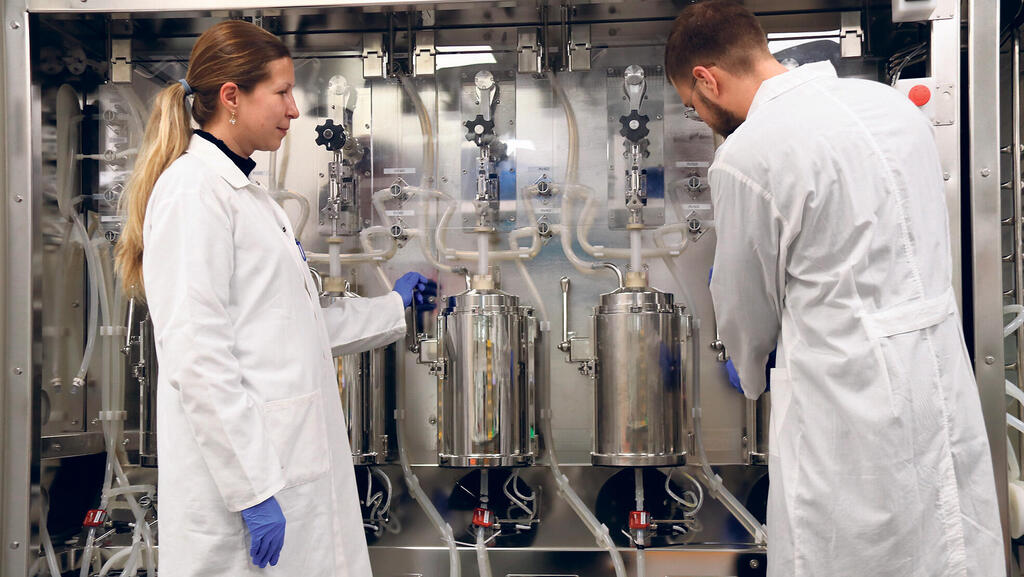
Tnuva building industrial cultured meat manufacturing facility
Israeli company Plurinuva, which is rebranding under the name Ever After Foods and is owned by Tnuva and Pluristem, is building the plant that is meant to lead to lower production prices, one of the main barriers currently holding back the industry
Israeli company Plurinuva, which is owned by the food giant Tnuva (20%) and the biotechnology company Pluristem (80%), has completed the development of a facility for the production of cultured meat capable of supplying products to the market on an industrial scale. According to the company, this is a unique solution that will allow factories in the field to increase their productivity by about 700% compared to cultured meat platforms that currently exist in the market.
Increasing the output of the facilities should also lead to lower production prices - a significant barrier in the industry today. The company plans to launch its first product this year, and is working to obtain regulatory approvals for marketing to consumers in Israel and the U.S.
Cultured meat is considered the holy grail of the foodtech field. But only one product has so far been approved for full marketing by regulators - in Singapore. Another product has received FDA approval in the U.S., but is still awaiting approval by the U.S. Department of Agriculture.
Plurinuva, which is now rebranding itself under the name Ever After Foods, had tackled two of the biggest challenges of the cultured meat industry with its product: streamlining the production process while reducing costs. The cultured meat industry currently relies on very large bioreactors (containers) in which animal-based cells are grown. Pluristem’s technology will allow growing cells in significantly smaller containers, while making greater use of the material. Thus, fewer resources will be required for production, and the quantities of raw material produced will increase significantly. Along with launching its own products, the company will offer for sale the platform it developed in a way that will also allow other companies to shorten the timeframe of developing cultured meat products.
Tnuva invested $7.3 million in the joint venture with Pluristem last year. The purpose of the partnership is to develop products based on Pluristem's cell development technologies that are currently applied in the pharmaceutical industry and can serve as a suitable platform for the development of cultured meat products, with Tnuva providing its industrial, commercial and regulatory knowledge in the field.
"Cultured meat companies are finding it difficult to come up with a product that can be produced efficiently today. When companies scale up, they encounter major biological and technological challenges," said the CEO of Ever After Foods, Eyal Rosenthal. "The industry is based on old systems that were used in the world of biotech and pharma, but they are not suitable for large production procedures. Our growing method overcomes the obstacles that exist today. We can produce more than 10 kg of cultured meat mass with a bioreactor of only 35 liters and we have found a way to expand production and reach price parity."
Related articles:
According to the company, its cell-based technology produces cultured meat composed of all the essential components found in regular meat, such as fat and muscle cells, as well as the extracellular matrix (ECM) proteins associated with them. Similar to all the cultured meat products currently under development in the world, the company's first products will be "hybrid", and will contain up to 50% cultured meat, alongside other plant components.
According to Shay Cohen, Tnuva’s Chief Innovation and Corporate Venturing Officer, and Managing Director at Tnuva Ventures, "the cultured meat industry will continue to be characterized in 2023 by massive investments in the creation of production facilities, regulatory approvals and the entry of new investment bodies into the field. Our platform faces the biggest challenge in the industry: making cultured meat accessible to the general public in mass production.”
Tnuva entered the cultured meat market last year for the first time, following in the footsteps of rival Strauss, which invested in Aleph Farms. Tnuva hoped that merging with an existing production platform would enable a significant shortening of timeframes, and the marketing of initial products in a relatively short period of time. Alternative meats are expected to make up 60% of the global meat market by 2040, and Tnuva is focusing on protein substitutes as one of its main growth drivers.